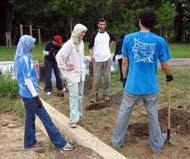A recent series of record-breaking snowfalls in Washington has sparked debate among global climate change observers — both its believers and detractors — as to the extent of humanity’s impact on the environment. While the pundits debate, environmentally conscious Washington-area Muslims are promoting a message of environmental stewardship to both Muslims and non-Muslims in their community.
As it turns out, a strong connection exists between Islam and protecting the Earth.
DC Green Muslims was born in October 2007 when a group of friends gathered for a vegetarian, environmentally friendly iftar. In the following months, the group held more environmentally friendly meals, attracting up to 150 people. Today, the group is an active member of Washington’s environmental awareness community.
But what is a green Muslim?
“A green Muslim is someone who realizes that being aware of their impact on the Earth is something that is not a foreign concept to Islam but knows that it is rooted in Islam,” Ryan Strom, an organizer with DC Green Muslims, told America.gov.
Strom said his loosely affiliated organization partners actively with other like-minded Washington-area groups dedicated to environmental preservation. DC Green Muslims has worked with Washington Parks and People to revitalize neglected parks and participated with Greater Washington Interfaith Power and Light (GWIPL) on a number of environmental programs.
“DC Green Muslims participated in a GWIPL dinner based on urban planning and how you interact with your neighborhood, how neighborhoods and cities are built and how they can impact your happiness,” Strom said.
In October 2009, DC Green Muslims participated in No Impact Week, hosted by the online news blog The Huffington Post. Group members discussed some of their No Impact Week efforts on the DC Green Muslims blog.
In step with its community activities, DC Green Muslims also plans to work with Washington-area mosques to further educate Muslims about Islam’s connection with environmental issues.
“We are hoping to hold environmental workshops for people who give khutbas[sermons] in mosques,” Strom said. “We are trying to outreach to community leaders at mosques in and around Washington, D.C., to get them to incorporate environmental stewardship from an Islamic perspective.”
For green Muslims, environmental consciousness in Islam is rooted strongly in both the Quran and the hadith (tradition of the Prophet Mohammad). Among the Quranic concepts that support environmental protection is that of khalifa, or stewardship, and amana, or trust.
Environmentally aware Muslims cite a Quranic verse that says amana was offered to the heavens, the earth and the mountains. However, they refused to accept such a burden and it was transferred to humankind.
They propose that in this situation, humanity becomes a fulcrum for the Earth. If humanity is centered and whole, the Earth is balanced. But if humanity is not balanced — by harming the environment and not promoting social justice — corruption will spread on Earth.
Concepts that support environmental awareness are also found in the prophetic tradition, say green Muslims. The Prophet Mohammad spent part of his youth closely connected to nature as a shepherd. And a saying attributed to him indicates the Earth can serve as a mosque and a means for purification.
They believe that if the Earth can serve as a mosque, this supports a strong argument against polluting its land and its water — used by believers in ritual ablutions.
A desire to protect and preserve their environment is not new among Muslim Americans.
In the late 1960s, Seyyed Hossein Nasr, currently a professor of Islamic studies at George Washington University, wrote Man and Nature: The Spiritual Crisis of Modern Man. In his groundbreaking work, Nasr explored the consequences of the environmental crisis and called for a restoration of balance between humanity and nature.
In September 2007, Ibrahim Ramey of the Muslim American Society (MAS) joined thousands of people in the Climate Emergency Fast to bring awareness to the global environmental crisis. On his blog, entitled Ibrahim Abdil-Mu’id Ramey — Voice of Reason, Ramey encouraged Muslims to fast just days before Ramadan.
“I believe that this additional act of fasting is necessary because, as Muslims, we are called to pray for the well-being of all mankind, and if we pray for humanity, fasting is, indeed, our most powerful and sincere form of prayer,” wrote Ramey, director of the MAS’ Freedom Foundation Human Rights and Civil Rights Division in Washington. “Believe me when I say that the Earth itself is in crisis. Real crisis. And this crisis threatens the delicate balance of nature that sustains all life on the planet.”
Whether Washington-based Muslim Americans are defending the Earth through prayer and fasting, authoring pioneering environmental awareness books or beautifying local parks, a common thread binds them all.
“At the core, our religion tells us that God has given us such a great natural resource and it is our job to protect and maintain it,” Strom said.
By America.gov
Related Links:



